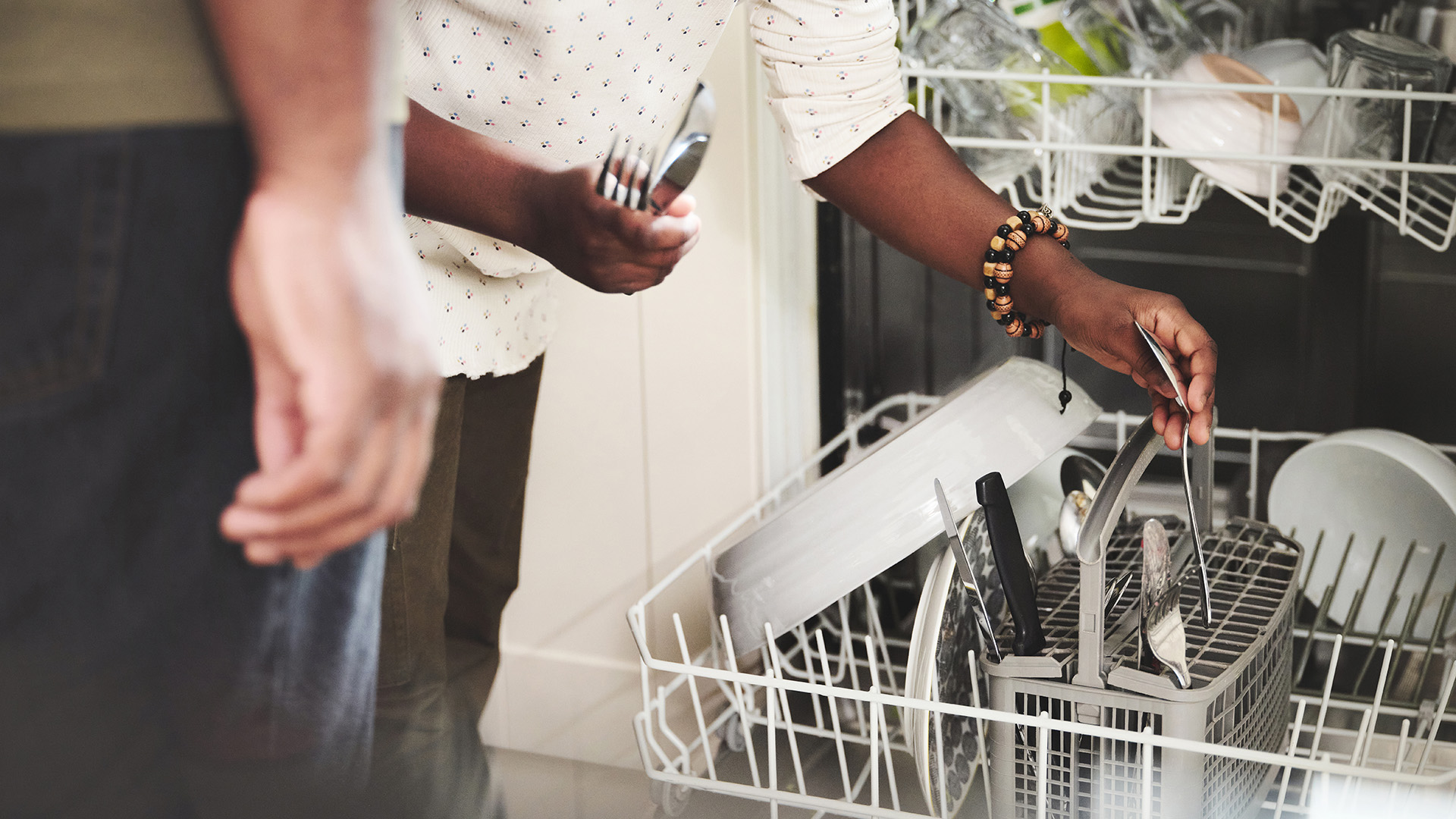How to choose a dishwasher: everything you need to consider
Our guide covers everything you need to know about choosing a dishwasher, from size and capacity to features and energy efficiency.

Sign up to receive the latest news, reviews, buying guides and deals direct to your inbox
You are now subscribed
Your newsletter sign-up was successful
Whether you want to upgrade or buy a dishwasher for the first time, knowing how to choose a dishwasher goes a long way to ensure that you're getting the best make and model for your home.
The dishwasher market has evolved in recent years, offering a huge range of choices from basic models to smart dishwashers that you can control from your phone. There's also something for almost all budgets and kitchen sizes, too.
If you've been on the fence about upgrading your kitchen with one of the best dishwashers on the market, our guide will help you navigate what to look for when shopping for the essential kitchen appliance.
To help you make the right decision, we've got expert advice from Lucy Baxter, Bosch Group Marketing Manager, BSH Home Appliances, and Samsung's Gino Grossi, Head of Brand and Category Marketing.
How to choose a dishwasher
1. Capacity
The first thing to consider when shopping for a new dishwasher is its capacity. Rather than measuring by dimensions, a dishwasher's capacity is usually measured in place settings.
"A place setting includes all the utensils needed for one person in a typical three-course meal: one dinner plate, one dessert plate, one soup bowl, one glass, one teacup and saucer, and cutlery," explained Baxter.
A standard dishwasher can hold around 12- to 16-place settings. For a family of four, a dishwasher with a capacity of at least 14 place settings would be ideal. That said, if you're a small family, but you use a lot of large cookware, it might be worth scaling up to make sure the dishwasher can cope with the load.
Sign up to receive the latest news, reviews, buying guides and deals direct to your inbox
A dishwasher's capacity can also be determined by the layout of the built-in racks.
An increasing number of dishwashers today offer adjustable racks that can be easily repositioned to accommodate dishes of different sizes and shapes. This helps to maximize space. In recent years, many dishwashers have also introduced a third rack above the traditional two racks. This additional rack offers extra space for cutlery, small items, and utensils.

Luxy Baxter is the Bosch Group Marketing Manager at BSH Home Appliances. The Bosch Group is a leading global supplier of technology and services and its operations are divided into four business sectors: Mobility, Industrial Technology, Consumer Goods, and Energy and Building Technology.
2. Dimensions
Dishwashers come in various sizes, but the most common width is 24 inches / 60cm. If your kitchen already has an allocated space for a dishwasher, chances are it will be set to fit a standard-size dishwasher. However, never just assume.
If you have a small kitchen, or it hasn't been upgraded for decades, you might find the gap measures closer to 18 inches / 45cm wide.
"Families and those who enjoy entertaining will benefit from a full-sized 60cm model, while smaller households or those with a compact kitchen will appreciate a slimmer 45cm width," Baxter said.
It's essential that you measure your available space accurately, as you'll also need to account for hoses and connections. Make sure to measure height and depth as well.
3. Dishwasher type
In addition to your dishwasher's size, it's worth looking into what type of dishwasher will work best.
All models fall into one of two categories: freestanding or integrated. However, you can get fully integrated and semi-integrated models. Semi-integrated models are designed to be installed into kitchen cupboards with only the controls visible, while the control panel of a fully integrated dishwasher is located inside the top of the door.
"Freestanding models simply sit under the counter and are relatively easy to install – it just needs a water inlet, waste, and electricity to be connected," explained Grossi. "Built-in models tend to be slightly more complicated as they need a door to be attached to the front of the dishwasher, and there are two different hinge types, fixed or sliding."
If you already have a dishwasher, you'll probably want to buy a like-for-like replacement, as this will make installation easier. You may also have to buy a freestanding dishwasher if that's how your kitchen has been configured, or vice versa.
However, if you're buying a dishwasher for the first time, it is best to research the pros and cons of each.
"Freestanding dishwashers are easier to remove for repairs and can be taken with you if you move," explained Baxter. "On the other hand, integrated options are concealed behind a door panel to match the kitchen cabinetry, creating a sleek and streamlined look that is perfect for contemporary and modern kitchens."
Both integrated and freestanding dishwashers have similar outer dimensions, but it's always important to double-check before purchasing, as even a few millimeters can prevent a new model from fitting into an existing space.

Gino Grossi is the Head of Brand and Category Marketing at Samsung. Samsung Electronics strives to deliver innovative products and experiences that maximize user convenience and make consumer lives better.
4. Cleaning performance
Once you know what capacity and dimensions you're dealing with, the next – and ultimately most important feature to look out for – is how well the dishwasher cleans and what cycles it offers.
Basic models offer standard cycles like Normal and Heavy, while more advanced dishwashers come with specialized cycles for sanitizing or handling delicate items. These options give you the flexibility to customize your loads based on your needs and what you're washing.
Features, like targeted spray arms and soil sensors, can also make a significant difference in cleaning performance. Soil sensors adjust the cycle time based on how dirty the dishes are, making sure you're not left with food residue on pots or plates.
If you're unsure how such features make a difference to your dishwasher's performance, read our guide: How do dishwashers work?
5. Noise levels
Dishwashers vary in noise levels, typically ranging from 38 to 62 decibels (dB), and they usually list their decibel level on their energy label.
"Any dishwasher with a decibel level of 44 dB or lower is considered to be quiet and comparable to a quiet library," said Grossi. This is important if your kitchen is close to living or sleeping areas.
"This is particularly relevant for people with open-plan kitchens who want to watch a movie without being disturbed by a noisy appliance," said Baxter.
"Dishwashers with brushless motors are generally quieter than those with other types of motors, so it is worth checking for this feature if noise is a concern."
6. Energy efficiency
An Energy Star-rated dishwasher can save you money on your energy bills and is better for the environment. These models use less water and energy, making them a smart long-term investment.
In order to check what star rating your dishwasher has, check the energy label that is usually found on the front of the appliance.
"This standardized system allows you to compare the energy consumption of different models, ranging from A to G, with A being the most efficient," said Baxter.
"The energy labels also provide information on the energy consumption of the eco-program per 100 cycles in kilowatt hours (kWh), water consumption per cycle on the eco-program in liters, and the duration of the eco cycle in hours and minutes."
"Higher-end dishwashers can use as little as eight liters in comparison to lower-end models and even hand-washing that use significantly more," added Grossi.
In addition to this star rating, some dishwasher models offer additional energy-saving and optimization features. The Half Load function found on Bosch models, for example, uses less water compared to a regular cycle.
Additionally, if you buy a dishwasher with smart features, you can usually monitor energy and water consumption indicators for your selected program, giving you more insight into your usage.
7. Smart features
Speaking of smart features, an increasing number of dishwasher models are now sold with WiFi and Bluetooth connectivity.
Beyond being able to monitor energy and water usage, when such models are connected to your Amazon Alexa or Google Home, you can use your voice or an app to turn the dishwasher on and off, change mode, and even choose from personalized cycles. If your dishwasher is too noisy, you can even say "Alexa, tell my dishwasher to be quiet."
"WiFi can also help look after your dishwasher and appliances through remote engineer assistance and prolong the life of your appliance with notifications and over-the-air updates," said Grossi. "This makes sure you're optimizing its performance and keeping it up to date."
However, such smart features usually come at a price. If you don't think you'll use them, then you could end up paying over the odds for features you don't need.
8. Cleaning
In addition to how well a dishwasher cleans your crockery, you need to consider how well the dishwasher itself is to clean.
A dishwasher should be easy to clean to maintain its performance. Features like removable, self-cleaning filters and stainless-steel tubs are easier to clean and more durable than their plastic counterparts.
9. Safety features
Safety is another aspect to consider when shopping for the best dishwasher.
Features like child locks, overflow protection, and delay start options can provide peace of mind, especially in households with young children.
10. Warranty
The average lifespan of a dishwasher is around 10 years, and it is recommended to purchase a model that comes with at least a 2-year warranty.
11. Customer reviews and ratings
Once you've narrowed down your dishwasher choices, make sure you check the customer reviews and ratings for each of your selected models. Manufacturer websites are designed to sell, so they'll naturally highlight the positives.
By comparison, customer reviews can reveal potential drawbacks that could influence your buying decision. Some criticisms might be minor and irrelevant to your needs, while others could point out significant issues that you'll want to avoid.
Moreover, customer reviews offer invaluable insights into a dishwasher's real-world performance, going beyond specifications and features. As you sift through these reviews, be vigilant about spotting fake ones, especially during the Black Friday sales. You'd be amazed at how many fabricated reviews are out there.
12. Quality of deals
Big sale events like Black Friday and Prime Day are excellent opportunities to invest in a quality dishwasher without breaking the bank. However, the key to making a wise purchase lies in understanding your needs and doing your homework.
"Whether you are finally making the leap from hand-washing or are just looking to upgrade, choosing the right dishwasher that fits your budget and style is a crucial purchasing decision," concluded Grossi.
"There are many options available for dishwashers on the market, and depending on your needs, narrowing down your options could prove challenging. In general, some of the key features to look for in a high-quality dishwasher are energy efficiency, noise level, the number of programs, WiFi connectivity, and water usage."
During events like Black Friday, it's tempting to jump on the best Black Friday dishwasher deal that you see.
However, some retailers inflate prices before the sale. Always compare prices across various stores and check historical data to ensure you're getting a genuine bargain. Price comparison sites like Honey and CamelCamelCamel are saviors, showing you price trends and prices at other stores.
Choosing a dishwasher during Black Friday ultimately comes down to how much room you have, your budget, and what you need it to do. This will determine everything from the capacity to size, cycle options, and more.

Victoria Woollaston, with nearly 20 years of experience, has reviewed gadgets, beauty tech, and household appliances for WIRED, TechRadar, and Expert Reviews. She specializes in critiquing coffee makers and small appliances for Top Ten Reviews. Victoria is also the founder and editor of inclusive beauty and grooming sites mamabella and MBman.
